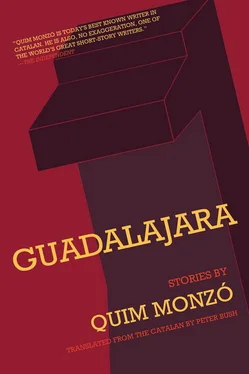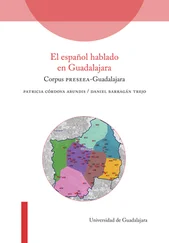Quim Monzó - Guadalajara
Здесь есть возможность читать онлайн «Quim Monzó - Guadalajara» весь текст электронной книги совершенно бесплатно (целиком полную версию без сокращений). В некоторых случаях можно слушать аудио, скачать через торрент в формате fb2 и присутствует краткое содержание. Год выпуска: 2011, Издательство: Open Letter, Жанр: Современная проза, на английском языке. Описание произведения, (предисловие) а так же отзывы посетителей доступны на портале библиотеки ЛибКат.
- Название:Guadalajara
- Автор:
- Издательство:Open Letter
- Жанр:
- Год:2011
- ISBN:нет данных
- Рейтинг книги:3 / 5. Голосов: 1
-
Избранное:Добавить в избранное
- Отзывы:
-
Ваша оценка:
- 60
- 1
- 2
- 3
- 4
- 5
Guadalajara: краткое содержание, описание и аннотация
Предлагаем к чтению аннотацию, описание, краткое содержание или предисловие (зависит от того, что написал сам автор книги «Guadalajara»). Если вы не нашли необходимую информацию о книге — напишите в комментариях, мы постараемся отыскать её.
Guadalajara — читать онлайн бесплатно полную книгу (весь текст) целиком
Ниже представлен текст книги, разбитый по страницам. Система сохранения места последней прочитанной страницы, позволяет с удобством читать онлайн бесплатно книгу «Guadalajara», без необходимости каждый раз заново искать на чём Вы остановились. Поставьте закладку, и сможете в любой момент перейти на страницу, на которой закончили чтение.
Интервал:
Закладка:
Once again Robin Hood sought out his black silk mask and feathered cap. He rode his steed along winding, labyrinthine paths that cleft the forest and returned to the castle owned by the richest of the rich who, on this occasion, were in the midst of a debutantes’ ball. They were astonished. “Not you again?” They didn’t find him as exciting as the first time round. One or two even complained: “I hope you don’t make a habit of this.” Robin Hood took their earrings (emeralds and pearls), tiaras (one was Greek, from Empúrias, handed down from mother to daughter across the centuries), rings (rubies, pure gold, lapis lazuli), bracelets, clasps (one made from ivory that Robin Hood found immensely beautiful), and a pearl necklace. One woman complained because she’d just purchased the earrings Robin Hood stole from her—to replace the ones he’d taken on his first visit. She was particularly annoyed because tracking down an identical pair had been a real pain. She tried to persuade him that her plea for mercy was entirely justified: if he were to steal those, she’d never find another pair: they were the last ones available. Robin Hood was unmoved, snatched them off of her, and put them in the sack with everything else. There were no candelabra. Robin Hood was surprised and asked why. They hadn’t had the time to go and buy new ones, the owner of the castle apologized. To compensate, he stole their bed linen, the Poussin painting, Bachannal , that was on the living room wall, and a Richard II chest of drawers. When the sack was full, Robin Hood crossed the forest in an easterly direction, toward the hovel of the poor family; they welcomed him with open arms and tear-filled eyes. “And about time too,” said the father, “we were on our last legs.”
The next time Robin Hood found the rich even less disposed to welcome him in. People complained while he was filling his sack with money (only one woman, caught napping, was wearing jewels: a silver hair-slide set with two rubies), carpets (three from Persia and one from Turkmenistan), a glass cabinet, and two beds. There was even a duke who tried to resist. Robin Hood kicked him unconscious. The rest of the revelers screamed. Robin Hood spurred on his steed and sped into the forest. The poor family welcomed him with whoops of delight; although, when they saw what he’d brought, one half complained because the booty was less bountiful than on the previous occasions.
In addition to his thirst for justice, Robin Hood had another virtue: perseverance. He repeated his incursions methodically. In the process he stole crockery, pillows, sofas, tables, and armchairs. He stole books, shelves, an umbrella stand, and armor (a whole suit: helmet, visor, chin-guard, gorget, neck and shoulder armor, breastplates, arm-guards, elbow pieces, gauntlets, halberd, thigh-guards, cod-piece, knee-guards, greaves, shoes, round shield and sword). From the wall, he took a Frenchified oblong, four-sided azurite coat-of-arms with a golden tree and two lions propping up its trunk; a gold frame with seven red fleurs-de-lis, arranged in two pairs and a threesome—sealed by a closed helmet and set opposite azure and silver mantling—and, for a crest, a fleur-de-lis pennant coming out of the helmet. He filched the remaining beds, a three-piece suite, and stoves. He dismantled wardrobes, gathered together desks, bureaus, bunk beds, glass cabinets, waste-paper bins, standard lamps, pouffes, children’s toys, kitchen sinks, towel-rails, sculleries, bathtubs and sinks, bidets, scales, medicine chests, shower curtains, torches, firelighters, stools, linen curtains, bottles (of whisky, cognac, and wine), and fireplaces.
Until one day, a long time afterwards, the rich, in rags, went down on bended knees before Robin Hood and spoke to him, imploring, “Mr. Robin Hood, we don’t question your goodness, noble spirit, and legendary generosity. We know you did it for the common good, to bring justice to mankind and compensate for the social inequalities perpetuated by the right to inherit. But you must consider that things aren’t what they used to be, that all we have left are these four walls. We have to sleep on the ground, because you even took our beds from us. We have no blankets to keep us warm, no saucepans to heat water and hoodwink our hunger. Mr. Hood, what more do you want from us? There is nothing more to take! We only have these walls, because you’ve taken even our roofs.”
Robin Hood was taken aback. He only needed to take one glance at what used to be a splendid castle not very long ago to see the truth in what they said. Their walls had been stripped and their rooms gutted, and the wealthy of old now slept in the corners, sheltering from the rain that poured in through where the roofs used to be. The rich were rich no longer. It was quite obvious they were poorer than the poor of old who had become richer than they, partly because of the wealth Robin Hood gave them and partly because of the skillful investment policies they’d pursued, thereby multiplying their wealth. But Robin Hood, so generous, obsessive and obstinate, had continued to steal from the rich, who were now, frankly, very poor, to give to the poor, who were, frankly, very rich. His generous attitude had turned the world upside down, to such a point that now (this was his sudden insight) the rich lived in abject poverty and the poor wallowed in conspicuous extravagance and had transformed what was previously a hovel into a complex of mansions, with a swimming pool, sauna, and all the latest paraphernalia. It had been years since the castle hosted its last party; on the other hand, the residential estate where the poor of old lived now celebrated weekly barbecues, if not a bacchanal. How come he’d not noticed before? He looked at the rich, the people he’d seen as exploiters, with a fresh pair of eyes and imagined the financial jamboree being enjoyed by those he’d thought of as poor until not so very long ago. He raged in anger. From his childhood he’d always felt indignant when he saw how the poor lived in abject poverty while the rich wallowed in luxury. He donned his black silk mask, straightened his hunting cap, with the slender, gray feather his Uncle Richard had brought back from the Tyrol. He grasped the reins of his steed, pointed it eastwards, and lashed its back with those very same reins.
3
A Day Like Any Other
The compulsive liar has spent an hour on his terrace, soaking up the sun. It’s a pleasant feeling after a cold winter, but a moment comes when all that sun makes him feel queasy. He puts a hand over his eyes, gets up from the lounger, goes inside, slips on a shirt and jacket, and walks out into the street. While he’s crossing the esplanade, he stares at the abandoned car that’s been parked by the football ground for two years and now has neither wheels nor doors. Why the hell don’t they move it and turn it into scrap metal? A heron flies low over the cemetery. He turns left and takes the long, sloping road.
He walks past the bar that’s halfway down the road; he stops when he’s about to leave it well behind. He wonders for a moment whether to go in or not and finally decides he will: he pushes the door open and lets out a general, Good day, to the owner and some customers who are playing dominos. He leans on the bar and orders a beer. The waiter serves him and, inevitably, asks how life’s treating him. The liar says, Well, and gulps his beer. His mustache is coated white. A poorly tuned radio is blaring out a melody punctuated by sounds that usually express pain. He watches the dominos game for a while. One of the players asks him if he wants to join in the next round, and he waves a hand to indicate that he doesn’t. He turns round, takes another gulp of beer, and gazes at the Russian salad under the glass cover. The golden-brownish hue of the mayonnaise makes him feel like ordering some. The owner sees him looking its way and asks him if he wants some. The liar says he doesn’t, because if he eats something now he won’t want dinner and his wife will nag. The owner smiles because it’s a standard joke: the liar isn’t married, he lives alone and always uses his imaginary wife as his excuse. When, for instance, he wants to leave and the others insist he has one for the road, or when they say he should play football with them on Sunday, and he doesn’t feel like it. He sometimes adds in children for good measure: a girl who, depending on the day, is between three and seven years old, and a boy who initially didn’t exist and is now even older than his sister. The owner washes a glass under the tap and is about to follow their ritual, extending the liar’s joke about the would-be wife by asking him whose wife, given he doesn’t have one. But before he can open his mouth, the liar asks him loudly—so everyone can hear—if he’s seen the circus they’re setting up on the esplanade. The owner is now drying the glass. Nobody answers. The liar turns to face the dominos players and continues in the same vein: There are three trailers, one of them huge and cage-like. One of the players raises an eyebrow, looks at him, and says, Of course there are. The liar pretends to be indignant: What does he mean “of course”? Is he implying it’s not true? He swears they’re setting up a circus on the esplanade. He’s seen the letters on the ground; they’re made of bulbs that will soon light up on the signboard on the tent: RUSSIAN CIRCUS. The tent, he now adds, is almost erected. There are four trailers. No, five, not four. And six cages: with lions and tigers. And three elephants: big as houses. The dominos players have finished their game and stare at him in astonishment: How can he be trying to make them believe yet another of his lies? However much goodwill they might feel toward him, how could they believe a man who always lies, who lies even when there’s no need to lie, when he won’t reap any benefit from lying? Their disbelief doesn’t waver for a moment or give way to doubt, but, as always happens, the liar speaks so convincingly and so heatedly that, as usual, they don’t believe him, but they are fascinated by the passion with which he tells and elaborates his lie. The elephants, for instance, soon become twelve rather than three; the tent is a triple, not single, affair; and the trailers, parked beside it in serried ranks, soon occupy an area the size of a football pitch. As he listens to what he is saying, one of the dominos players (they’ve finished the game and haven’t yet started another) feels his eyes begin to blur. No circus has come to town in thirty years, and he’s sure, at the rate things are going, that no circus will ever erect its tent on the esplanade again. None of them misses having the circus (not even the liar, although he’d argue the opposite if need be), and if a circus ever did come, they wouldn’t be at all interested: circuses belong to bygone times, and even then people weren’t interested. However, their lack of interest doesn’t stop them from listening, fascinated by the way he unrolls the canvas sails and erects one tent after another, how he makes the drums roll and multiplies the number of acrobats with such conviction—even though he never thought any of them believed him, let alone that, by virtue of his persistence, he himself would believe his own story. Only one (on the deaf side) asks in an unduly loud voice if anyone wants another game. But nobody answers: someone else has already suggested immediately going to the esplanade. He doesn’t need to twist their arms. They now harangue each other, put on their coats and scarves, and are in the street, walking next to the liar, who’s describing a pyramid of thirty-six tightrope artistes riding eight unicycles and a horse that can juggle. The last to leave is the owner, who puts on his jacket, pushes out the guy who’s on the deaf side, locks the door, and breaks into a run in order to catch the group of men who are hurrying along the road.
Читать дальшеИнтервал:
Закладка:
Похожие книги на «Guadalajara»
Представляем Вашему вниманию похожие книги на «Guadalajara» списком для выбора. Мы отобрали схожую по названию и смыслу литературу в надежде предоставить читателям больше вариантов отыскать новые, интересные, ещё непрочитанные произведения.
Обсуждение, отзывы о книге «Guadalajara» и просто собственные мнения читателей. Оставьте ваши комментарии, напишите, что Вы думаете о произведении, его смысле или главных героях. Укажите что конкретно понравилось, а что нет, и почему Вы так считаете.












